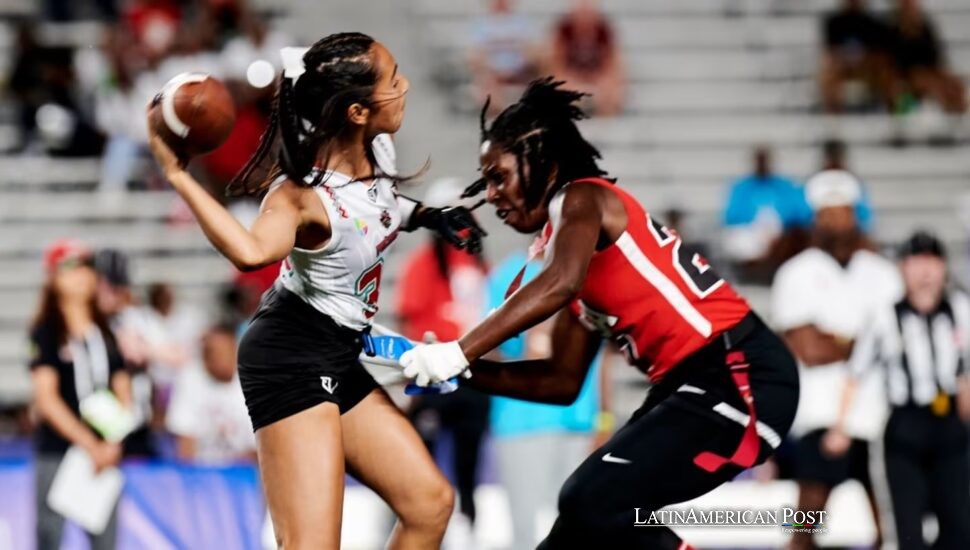Mexico Gains Flag Football Olympic Powerhouse Recognition

An electrifying chapter is unfolding for Mexican sports on the global stage as flag football prepares to make its Olympic debut at the Los Angeles 2028 Games. Steeped in tradition along with success, stands ready to thrill spectators across the globe in this dynamic new competition.
A Rising Power Poised for Olympic Success
Over the past several decades, Mexico has steadily built a stellar reputation in international sports. From boxing, taekwondo along with soccer, Mexican athletes showcase their determination at international contests as they earn countless medals or titles. A surprising but very promising path emerges: the fast paced sport of flag football. Observers have been quick to note the synergy of Mexican athletes’ discipline and agility with this non-tackling variation of American football—an emerging global phenomenon.
Although tackle football typically commands headlines in North America, flag football’s inclusivity and minimal equipment requirements have made it a grassroots favorite. Mexico’s men’s as well as women’s teams rank consistently among the leading contenders connecting field excellence with solid fan backing. The achievements reflect deep community involvement, where schools, amateur competitions or pro organizations invest substantially in training. U.S. rivals keep control, yet experts observe Mexico’s silver medals plus gold wins prove their advanced play techniques.
American football in Mexico remained behind soccer’s popularity for decades. A major shift occurred after college tackle programs gained momentum, which sparked Mexico’s passion for flag football. Students who came back from American schools started local teams along with recreational leagues for adults or youth players. Flag football’s basic requirements – needing just a few items – made the game available to most people. Today, thousands of men and women gather on weekends to refine passing routes and defensive maneuvers, forging a robust pipeline for national squads.
Mexico anticipates a major expansion of flag football after the International Olympic Committee added the sport to the 2028 Los Angeles Games. The nation’s loyal fans really look forward to cheering their athletes on this grand stage. Young players across the country will sign up in rising numbers as well as pursue dreams of becoming Olympic champions. A wave of enthusiasm shows in Mexican media outlets next to widespread coverage. Local sports journalists focus on the national team’s victories at the World Games, along with predictions about future success. The press invites supporters to picture their teams competing for medals in a fully sanctioned Olympic tournament.
Inside the Sport’s Electric Growth
Flag football brings an up-tempo, offense-driven spectacle that enthralls modern audiences. Played on a compact 50-yard field, teams of five each push for quick gains across short downs. Players wear belts from which defenders yank flags to end plays, replacing the physical collisions of tackle football with speed and agility. The minimal contact fosters a more open style, featuring dazzling runs, lightning-quick pass routes, and creative trick plays.
Mexico’s teams have built a formidable blueprint for success, combining intense conditioning with strategic cunning. Observers comment on the lethal synergy that arises from quarterback leadership—whether on the men’s or women’s side—and receivers who track the ball with uncanny accuracy. Defensive backs, meanwhile, excel in tight coverage and blistering pursuit, snagging flags from unsuspecting ball carriers. The result is a brand of flag football that is both energetic and disciplined, a spectacle that many say could translate superbly to prime-time Olympic viewing.
Recent competitions underscore how Mexico’s women’s squad, in particular, has captured attention. Triumphant performances in international tournaments highlighted dynamic passing attacks, with star quarterbacks reading coverages in real-time. Fast, deceptive footwork ensures that defenders rarely lock down receivers. On the men’s side, the national program likewise has landed near the top of world rankings, second only to the United States in numerous events. These track records are fueling broad confidence that Mexico will be among the main medal contenders once LA28 arrives.
Yet maintaining this edge demands strategic refinement. Coaches now focus on advanced analytics, breaking down films of rivals from the United States, Europe, and Asia. As the pool of global participants widens, so does competition. Talent from regions like Germany or Japan, once on the sport’s periphery, continues to emerge. For Mexico, the challenge is to keep the momentum—blending established leaders with younger athletes, developing fresh coaching techniques, and using every training camp to keep up with the game’s evolving strategies.
Women Leading The Charge
Mexico’s women’s flag football athletes receive widespread acclaim because of exceptional performances worldwide. The team had to overcome gender barriers which had formerly limited women’s participation in male-dominated sports. Victories by the national team together with tournament wins transformed society’s perspectives. Television broadcasts of female matches show this transformation: Skilled players who display precision or athletic spirit attract passionate fan support.
The successes achieved by women in flag football inspired a whole new generation of girls to view this sport as a viable professional opportunity. State authorities provide financial support to improve sports facilities and establish women-only leagues. Increasing participation of women transforms athletic settings by offering female competitors expert training and major tournament preparation opportunities. Such robust female representation might position Mexico as an especially fierce competitor at the Olympic level, where the women’s bracket could become just as prominent as the men’s.
With each tournament victory, Mexico’s female team captains stress how building supportive team traditions benefits future players. Flag football creates unity between men or women players as well as promotes independence along with leadership skills among female athletes. Mexican success on the world stage has emboldened these ambassadors to serve as mentors, igniting fresh energy among teen girls who might see themselves as future Olympians. The result is a grassroots groundswell that crosses urban and rural lines, connecting participants in ways reminiscent of how soccer once dominated hearts.
Dreams of Gold at LA28
The excitement for LA28 continues to grow. Flag football’s Olympic debut presents a chance for Mexico to challenge U.S. dominance. Mexico’s runner up positions at global competitions demonstrate their competitive level. A compact field or rapid matches in the Olympic format suits Mexico’s dynamic playing style. Quick passes, agile maneuvers along with coordinated defensive strategies really excel at this prestigious event.
The Olympic spotlight offers Mexico an opportunity to expand its sports reputation. Stars in flag football could share attention with boxers or soccer players showing Mexico’s athletic diversity. The public’s enthusiasm rises for this fast paced game as they support their team’s Olympic medal pursuit. Social platforms are now buzzing with talk about team selection and competitor analysis.
To reach success, teams need to practice intensely, train with top coaches, and compete against top teams. Mexican trainers aim to expand their previous successes while adapting to new competition. Local university partnerships enable the identification of skilled players from regions with inadequate sports infrastructure. The appeal of LA28 promises to draw funding from officials and businesses, which will serve as a benefit to youth athletics on a broad scale.
Also Read: Remembering the Fight that Taught Latin America How Sports Promote Cultural Richness
Mexico stands before an exceptional chance to succeed as a soccer powerhouse while becoming a growing power in flag football. The combination of community backing and tournament victories and their drive to compete at the top positions in Mexico as genuine contenders for a gold medal. Fans who come together in Los Angeles could prompt the entire Americas region to rally behind Mexico’s talented teams as they celebrate their ascent to prominence. If Mexico captures top honors, it will fulfill a narrative years in the making—one that merges national grit, homegrown athletic prowess, and the universal appeal of a fast-paced, accessible sport.





